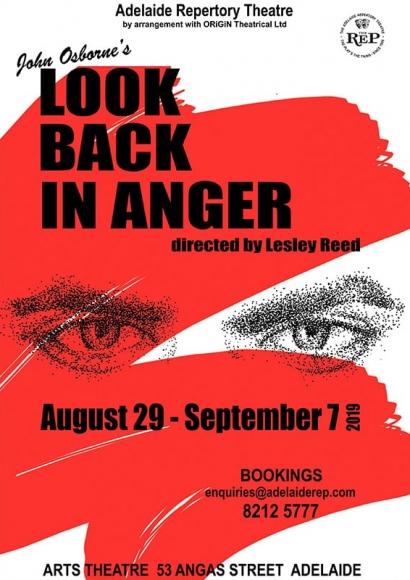British playwright John Osborne’s Look Back In Anger is very much a realistic play which surfaced in a world of escapist theatre, musicals perhaps, post World War 2., spawning the movement of “kitchen sink drama.”
Realism dealt mainly with issues abounding in Britain in a world which remained little unchanged after the world conflict.
Look Back In Anger explores the theme of the “angry young man” in 1950’s Britain.
It is set in this period and the play’s protagonist, Jimmy Porter’s rather left wing political and social views can be seen as typical of the times, providing the main themes of the play.
There is an enormous social chasm between the University educated working class Jimmy and the equally well- educated upper middle -class wife, Alison. This disparity is a key issue for the basis of Jimmy’s anger.
Director Lesley Reed’s outstanding production adheres to the original script and setting despite monumental changes in society’s attitudes and values occurring over the ensuing years.
The multipurpose setting, based on a concept by Director Reed and designed by Brittany Daw is a claustrophobic, dilapidated room in a seedy boarding house and it works remarkably well. It smacks of the working-class lives of Jimmy, his mate and partner Cliff and Alison. It is so grubby one can almost smell the dirty socks!
As audience we recoil at the constant barrage of invective Jimmy aims at Alison, the upper middle class from which she comes and the failure of the class system which Jimmy sees as unchanged after the war, forming a barrier to fulfil his dreams and aspirations. He cannot envisage any advancement in his life and the lives of others like himself.
We weep for Leah Lowe’s (Alison) frailty at her husband’s vituperative anger and silent submission to his tirades.
Jimmy’s friend Cliff is played with great conviction by James Edwards, allowing himself as another target for Jimmy’s struggles. Jessica Carroll gives a strong performance as Helena when she comes to visit her friend Alison, taking up the ironing where Alison left off.
As Colonel Redfern, Jack Robins plays Alison’s father sensitively, demonstrating his lack of understanding of the love between Jimmy and Alison.
The cast of this production are uniformly excellent but the stand- out is a powerful, intense performance from Adam Tuominen as Jimmy Porter, who embodies all the frustrations, struggles and hopes of so many young men of the times. As Jimmy, Adam makes it abundantly clear to us that little, if anything, has changed since the war.
Lesley Reed has given us a splendid production, true to its times, yet despite this we must consider that there are still many who struggle as Jimmy Porter has struggled and this production which Ms Reed describes as a “social essay,” makes this infinitely clear.



